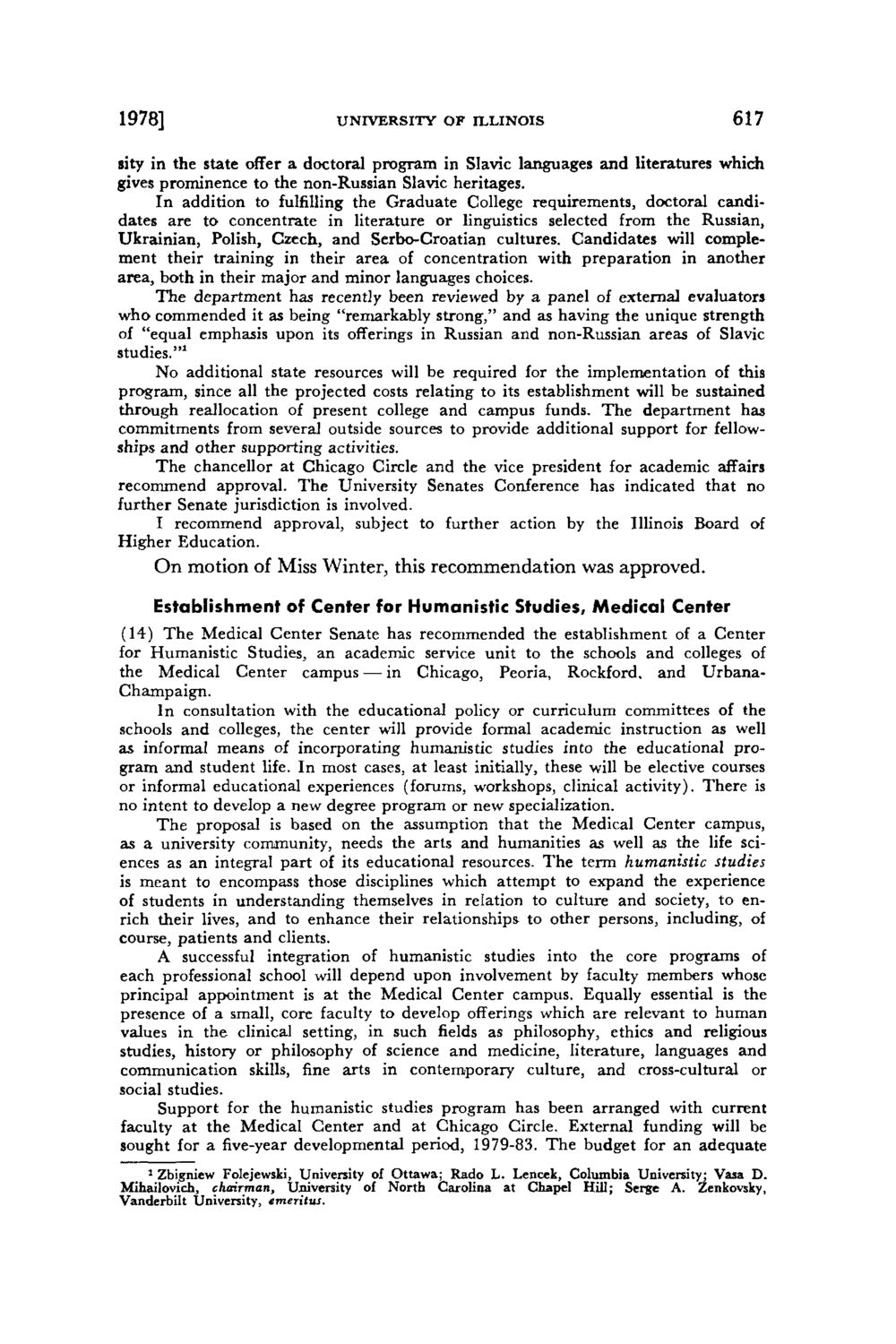| |
| |
Caption: Board of Trustees Minutes - 1978
This is a reduced-resolution page image for fast online browsing.

EXTRACTED TEXT FROM PAGE:
1978] UNIVERSITY OF ILLINOIS 617 sity in the state offer a doctoral program in Slavic languages and literatures which gives prominence to the non-Russian Slavic heritages. In addition to fulfilling the Graduate College requirements, doctoral candidates are to concentrate in literature or linguistics selected from the Russian, Ukrainian, Polish, Czech, and Serbo-Croatian cultures. Candidates will complement their training in their area of concentration with preparation in another area, both in their major and minor languages choices. The department has recently been reviewed by a panel of externa] evaluators who commended it as being "remarkably strong," and as having the unique strength of "equal emphasis upon its offerings in Russian and non-Russian areas of Slavic studies." 1 No additional state resources will be required for the implementation of this program, since all the projected costs relating to its establishment will be sustained through reallocation of present college and campus funds. The department has commitments from several outside sources to provide additional support for fellowships and other supporting activities. The chancellor at Chicago Circle and the vice president for academic affairs recommend approval. The University Senates Conference has indicated that no further Senate jurisdiction is involved. I recommend approval, subject to further action by the Illinois Board of Higher Education. On motion of Miss Winter, this recommendation was approved. Establishment of Center for Humanistic Studies, Medical Center (14) The Medical Center Senate has recommended the establishment of a Center for Humanistic Studies, an academic service unit to the schools and colleges of the Medical Center campus — in Chicago, Peoria, Rockford. and UrbanaChampaign. In consultation with the educational policy or curriculum committees of the schools and colleges, the center will provide formal academic instruction as well as informal means of incorporating humanistic studies into the educational program and student life. In most cases, at least initially, these will be elective courses or informal educational experiences (forums, workshops, clinical activity). There is no intent to develop a new degree program or new specialization. The proposal is based on the assumption that the Medical Center campus, as a university community, needs the arts and humanities as well as the life sciences as an integral part of its educational resources. The term humanistic studies is meant to encompass those disciplines which attempt to expand the experience of students in understanding themselves in relation to culture and society, to enrich their lives, and to enhance their relationships to other persons, including, of course, patients and clients. A successful integration of humanistic studies into the core programs of each professional school will depend upon involvement by faculty members whose principal appointment is at the Medical Center campus. Equally essential is the presence of a small, core faculty to develop offerings which are relevant to human values in the clinical setting, in such fields as philosophy, ethics and religious studies, history or philosophy of science and medicine, literature, languages and communication skills, fine arts in contemporary culture, and cross-cultural or social studies. Support for the humanistic studies program has been arranged with current faculty at the Medical Center and at Chicago Circle. External funding will be sought for a five-year developmental period, 1979-83. The budget for an adequate 1 Zbigniew Folejewski, University of Ottawa; Rado L. Lencek, Columbia University; Vasa D. Mihailovich, chairman, University of North Carolina at Chapel Hill; Serge A. Zenkovsky, Vanderbilt University, emeritus.
| |